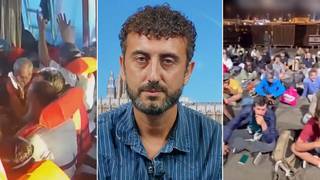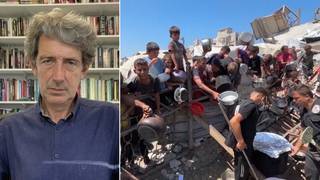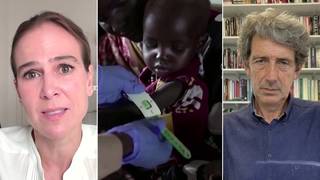
LaDonna Brave Bull Allard, Standing Rock Sioux tribal historian, has died of cancer at the age of 64, and we look back on her work, through interviews on her land and in the Democracy Now! studio. Allard co-founded the Sacred Stone Camp on Standing Rock Sioux land in April 2016 to resist the Dakota Access pipeline, to which people from around the world traveled, making it one of the largest gatherings of Indigenous peoples in a century. “We say mni wiconi, water of life. Every time we drink water, we say mni wiconi, water of life. We cannot live without water,” LaDonna Brave Bull Allard said in a September 2016 interview with Democracy Now! “I don’t understand why America doesn’t understand how important water is. So we have no choice. We have to stand. No matter what happens, we have to stand to save the water.”
Transcript
AMY GOODMAN: This is Democracy Now! I’m Amy Goodman.
We end today’s show remembering the life of Standing Rock Sioux historian LaDonna Brave Bull Allard. She died Saturday at the age of 64 from brain cancer.
In 2016, she helped start the Sacred Stone Camp on her family’s property in North Dakota. People from around the world traveled to Standing Rock Reservation in what became one of the largest gatherings of Indigenous people in a century.
I first spoke to LaDonna at Standing Rock in September 2016 along the Cannonball River on her property, just hours before the Dakota Access pipeline company unleashed dogs and pepper spray on Native Americans seeking to protect a sacred tribal burial site from destruction.
LADONNA BRAVE BULL ALLARD: My name is LaDonna Brave Bull Allard. My real name is Ta Maka Waste Win, Her Good Earth Woman. I am Ihunktonwan, Hunkpatina and Pabaska Dakota on my father’s side. I am Hunkpapa, Sihasapa and Oglala Lakota on my mother’s side. …
When they told us that they were putting this pipeline in, but refusing to acknowledge us — if you look at the Dakota Access maps, they don’t even acknowledge our nation. We are not blacked out, like some people make maps, and they do the reservation boundaries. We’re not even in there. They said they did not have to consult with us. That pipeline is 500 feet from our reservation line. When that pipeline breaks — and it will break — it will hit Early Head Start children in two seconds. It will take out our elementary in five seconds. In 45 minutes, it will take out our major water intake that feeds water to all the people here.
I don’t understand why we are expendable in America. I keep telling people, we do our best. We have always been here. This is our land. Why should we fight to live on our own land? Why should we have to do that over and over again? We start our lives. We do our best to live. Why? I would never hurt anybody. I have always done my best to do good things in my community. Why can’t they just let us live? We love this land. And half of the time I feel bad, because they make us feel bad for loving this land.
But most important, we love the water. Every year, our people sacrifice. We go four days without drinking water, so that it reminds us how important this water is. And I ask everybody: Do you go four days without water? What happens to your body on that third day? Your body starts shutting down. So, we remind ourselves every day how important. We say mni wiconi, water of life. Every time we drink water, we say mni wiconi, water of life. We cannot live without water. So I don’t understand why America doesn’t understand how important water is. So we have no choice. We have to stand. No matter what happens, we have to stand to save the water.
AMY GOODMAN: That’s LaDonna Brave Bull Allard. We spoke to her on her property at the Sacred Stone Camp in September, Labor Day weekend, of 2016. A few weeks later, she visited Democracy Now!’s studios here in New York while she was here to speak at the United Nations. Juan González and I interviewed her.
LADONNA BRAVE BULL ALLARD: I told Dakota Access that if I’m the only person standing, I’m standing. They will not build this pipeline. I have personal reasons, though, you know? You know, my son is buried there. And I’m just a mom. But in my mind, I can’t conceive anybody to build a pipeline next to my son’s grave. So, like I tell everybody, it’s not some grandiose “save the world.” It’s just a mom. So, that’s just on my personal side. But did you see where I live? Oh my god, it is so beautiful. I mean, every day the buffalo are out there. The eagles are out there. I love my river. …
JUAN GONZÁLEZ: Were you surprised by the enormous response that occurred to the encampment from Native peoples around the country and around the hemisphere, really?
LADONNA BRAVE BULL ALLARD: Overwhelming, shocking, amazing. That tells me that world thought needs to change now. That tells me that people are saying, “No more.” You know, how it is to live our lives, we spend a lot of time with people saying we’re this, we’re that, we can’t do this, we live in a world of extreme racism where we exist. And I think we’re at the point now which is no more.
AMY GOODMAN: On September 3rd, after we interviewed you at your camp, that’s on your property, the Sacred Stone Camp, we went over beyond the resistance camps, because hundreds of Native Americans were going to plant their tribal flags in an area where the pipeline was being built — they didn’t think it was being built that day; it was Labor Day weekend — but to, in a ceremony, to take that stand. But when they got there, they saw the bulldozers in action, bulldozing the very sites that your tribe, that the Sacred Stone — that the Standing Rock Sioux Tribe had designated, had said was burial grounds and sacred sites. I wanted to go to that moment and ask you about what happened after that, the security guards working for the Dakota Access pipeline company attacking the Native Americans with pepper spray and with their dogs.
WATER PROTECTOR 1: This guy maced me in the face. Look, it’s all over my sunglasses. Just maced me in the face.
WATER PROTECTOR 2: These people are just threatening all of us with these dogs. And she, that woman over there, she was charging, and it bit somebody right in the face.
AMY GOODMAN: The dog has blood in its nose and its mouth.
WATER PROTECTOR 2: And she’s still standing here threatening us.
AMY GOODMAN: Why are you letting their — her dog go after the protesters? It’s covered in blood!
VICTOR PUERTAS: Over there, with that dog. I was like walking. Throwed the dog on me and straight, even without any warning. You know? Look at this. Look at this.
AMY GOODMAN: That dog bit you?
VICTOR PUERTAS: Yeah, the dog did it, you know? Look at this. It’s there. It’s all bleeding.
AMY GOODMAN: So, there we see the dog’s nose and mouth dripping with blood, and they’re attacking the protesters. LaDonna Brave Bull Allard, you were there, as well.
LADONNA BRAVE BULL ALLARD: Yes. We had got there — let me back up first. You know, just two days before, we marked all those burials and sacred sites, and then we submitted them to the judge. And the judge notified Dakota Access. So when they stopped construction 40 miles away and drove up to take out those burial sites, it was absolutely shocking for us.
You know, when I got up there, you know, I remember my friend, she was just crying. And I was like, I couldn’t believe they were doing that. And so, people were hollering, and that man had just pepper-sprayed everybody. And I was just like, “Oh my god! What is happening here?” And I remember the dogs and stuff. That big grey-headed dog was on this side, and that woman was siccing dogs on this side. And I was standing in the middle there, and I was like, “What do I do?” And so I closed my eyes and just started praying. I just stood there and prayed. And I thought, “Where am I? Is this America? Is this really happening?”
And I opened my eyes, and the people were getting in their trucks. I had no idea at that time the horses were coming to protect us from behind us. And as I stood there, I think it’s still very shocking to me, because people were hollering, and people were crying. And these guys finally started to get their dogs and put them into their vehicles, and the dogs tried to bite their owners. It was just chaos. And so, they finally started leaving. And I looked at that ground. I was like, “Oh my god! Who does this? Who comes and just digs up those graves?” It’s almost inhuman to me. I don’t understand it. I can’t understand it.
JUAN GONZÁLEZ: And so, the point I think it’s important to underscore, that you had already provided to the court the list of the burial sites that you thought were sacred sites that should be preserved. And the company, before the judge can even render a ruling, then goes in on the weekend to destroy those very sites.
LADONNA BRAVE BULL ALLARD: Yes. And that’s what I keep on telling peoples is why are these people out there protesting. It’s because of these things. It’s because of what’s actually happening out there on the ground. …
I tell people that this is not about just this pipeline. It’s about the water. It’s about the water. It’s about having the right to live our lives. It’s about being able to make sure my grandchildren has clean water. To me, it’s just like common sense. And so, we must — we must stop this. …
AMY GOODMAN: How long will these resistance camps continue?
LADONNA BRAVE BULL ALLARD: We’re in a process of healing. I don’t think it’s going to end. We have only just begun. We are fulfilling prophesy now. The prophesies our people told a hundred years ago are coming to pass. I see them before my eyes. Nothing is going to go back. We can only change. My whole idea is to have the world change their worldview, that maybe we can live with the Earth instead of destroying the Earth. And I’m hoping that all people can get that message.
AMY GOODMAN: Standing Rock Sioux Lakota historian LaDonna Brave Bull Allard. She died Saturday at the age of 64 from brain cancer.
Visit democracynow.org to see more of our interviews with LaDonna Brave Bull Allard and former U.S. Attorney General Ramsey Clark, who died Friday at the age of 93.
And that does it for our show. A very Happy Birthday to María Taracena and Anna Özbek!
Democracy Now! is currently accepting applications for a senior news producer to join our team here in New York City. Learn more and apply today at democracynow.org.
I’m Amy Goodman. Thanks so much for joining us. Remember, wearing a mask is an act of love.












Media Options